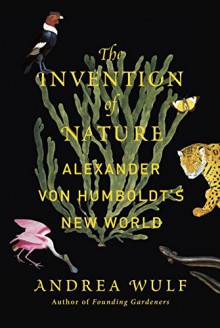
PROLOGUE & PART 1 - DEPARTURE: EMERGING IDEAS
"No one had ever comet his high before, and no one had ever breathed such thin air. as he stood at the top of the world, looking down upon the mountain ranges folded beneath him, Humboldt began to see the world differently. He saw the earth as one great living organism where everything was connected, conceiving a bold new vision of nature that still influences he way that we understand the natural world."
Alexander von Humboldt was an extraordinary scientist and adventurer who influence many of the greatest thinkers and scientists of his day, and whose insight into the working of the world gave us our current concept of nature. However, he has been largely forgotten and barely gets mentioned when compared to Charles Darwin. In the prologue, the author states her objectives "to rediscover Humboldt, and to restore him to his rightful place in the pantheon of nature and science", and "to understand why we think as we do today about the natural world."
Part 1 of this book discusses Alexander von Humboldt, his family, his early life, education and inventions. However, the author fails to mention his half-brother or sister who died young. So this isn't a complete, definitive biography, and Wulf appears to be including only those aspects of Humboldt's life that she thinks is important. Good news for those who want the basics and the science bits.
Wulf also provides a context for Humboldt by showing us the world he was born and raised in, i.e. the Age of Enlightenment. This section also describes his relationships with the foremost thinkers of the day (Goethe, Schiller,Kant etc), and how he influenced and was influenced by these people; thus providing insight into the development of Humboldt's concept of the world with which he would view his experiences in South America and elsewhere.
"Being with Goethe equipped Humboldt with 'new organs' through which to see and understand the natural world."
Part 1 ends with how Humboldt finally got the freedom, finances and permission to follow his dreams. Being stuck on a continent whose leaders were all going to war with each other didn't help much.
"But the real purpose of the voyage, he said, was to discover how 'all forces of nature are interlaced and interwoven' - how organic and inorganic nature interacted. Man needs to strive for 'the good and the great', Humboldt wrote in his last letter from Spain, 'the rest depends on destiny.' "
So far, this is an enjoyable and beautifully written book. The author doesn't get bogged down with lists of dates and who begat whom etc. The descriptions of the towns and people visited are brief and relevant to the narrative, without excessive, long winded paragraphs of filler. One can feel the over-enthusiastic energy of Alexander von Humboldt (someone really needs to slip him a valium or a sedative!), his brother's concern for him, and the excitement Goethe feels when Humboldt visits - all from a few sentences.
The next section discusses Humboldt's trip though South America.

NOTE ON THE E-BOOK: The book contains numerous illustrations and three maps which don't display very well in e-book format.


 Log in with Facebook
Log in with Facebook 









